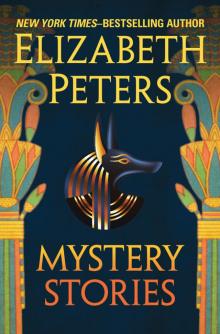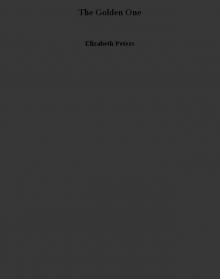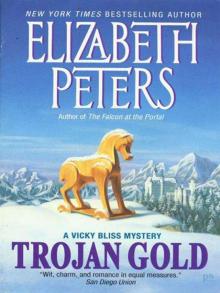- Home
- Elizabeth Peters
Night Train to Memphis vbm-5 Page 3
Night Train to Memphis vbm-5 Read online
Page 3
‘Nicht,’ I said. ‘I don’t know anything about . . . Oh, hell, what’s the use? There’s just one thing, Karl. Schmidt.’
‘What about him? Everyone knows he has a fondness for you; he would give you leave of absence for such a chance as this.’
‘No! I mean, yes, he would, that’s just the trouble. He’ll want to come too!’
‘So? He will not know your real purpose.’
‘Oh, God.’ I clutched at my head with both hands. My hair promptly fell down over my face. I had been experimenting with braids that week, and I hadn’t quite got the knack of winding them around my head. No matter how many bobby pins I stuck in, the structure had a tendency to collapse under pressure.
Karl began collecting bobby pins from the table while I tried to explain. ‘Schmidt has the most lurid imagination of anyone I know. Even if I were an innocent tourist he’d assume I had an ulterior motive – something romantic, as he calls it. He’ll poke his nose into everything and screw everything up and get himself in trouble, and I’ll have to get him out of it. If Schmidt goes, I don’t. That’s flat.’
Karl Feder looked thoughtful. He wasn’t as familiar with Schmidt’s peculiarities as I was, but he had heard a thing or two. ‘Ah, I see. Well, my dear Vicky, do not worry. We will think of some way of preventing him.’
I didn’t like the sound of that. ‘You’re not to hurt him, Karl. No hit-and-run or broken legs.’
‘Would we do such a thing?’
‘You might not, but if I read Herr Burckhardt and his crowd aright, they wouldn’t hesitate. I’m not kidding, Karl. If you touch a hair of Schmidt’s moustache I’ll blow the whole deal wide open.’
‘I believe you,’ Karl said.
‘You damn well better. All right. If you can get Schmidt out of the way, I’ll do it. What happens next?’
‘We will handle all the arrangements. Your passport is in order, I assume? Good. Visa, tickets, and other necessary documents will be delivered to you within a few days. My secretary will make the appointments for you, but she cannot take the inoculations – hepatitis, typhoid, typhus – ’
‘Urck,’ I said. I hate shots. ‘Is all that necessary? I thought this was a luxury cruise.’
‘We cannot risk your falling ill,’ Karl said seriously. He took a thick manila envelope from his breast pocket and handed it to me. ‘I must ask you to sign a voucher acknowledging receipt of the money. We will supply a medical kit, camera, binoculars, and the like, but I assume a young lady will want to purchase her own clothing and other personal effects.’
It was a very thick envelope. Karl’s smile was very bland. I sighed. ‘We have already determined what you are, madam,’ I quoted. ‘All that is left is to determine your price.’
‘Bitte?’ said Karl.
‘Never mind.’
‘We will take care of everything,’ Karl repeated. ‘You need do nothing . . . Excuse me, what was it you said?’
He knew perfectly well what I had said. He prefers to believe a lady doesn’t use words like that.
I pushed my chair back and stood up. ‘Anything else?’
Karl reached into his pocket again. The object he withdrew was a slick, brightly coloured brochure. It had been folded once, lengthwise, to fit in his pocket. He unfolded it and handed it to me.
On the cover, under a tastefully designed title, was a photograph of the Sphinx, with the pyramids of Giza behind it. It was a gorgeous photo; the pyramids were a soft pale gold, the sky above them was a bright clear blue. The smile on the face of the Sphinx has been described in a number of ways – mysterious, enigmatic, contemplative. At that moment it seemed to me that it bore a distinct resemblance to the smug smirk on Karl Feder’s face.
V
Two weeks later I sat on a rock at Giza contemplating the real thing. I was trying to avoid the eyes of the Sphinx. It was still smirking.
The actuality wasn’t as attractive as the photograph. The photographer must have been a genius or a magician to eliminate other objects from his composition. There were lots of them, all more or less unattractive. Camels (they are not, at their best, handsome animals), tourists (ditto), guides and peddlers in dirty flapping robes, cheap souvenir shops, scaffolding and barbed wire and makeshift, ramshackle bits of fencing and construction. However, only a pedant would quibble about such minor flaws. The pyramids were wonderful. The Sphinx would have been magnificent, marred and scarred though it was, if it hadn’t been smirking. Was I enjoying the view? No, I was not.
My arms were swollen and sore from too many shots too close together, but that wasn’t what bothered me. The sun was beating down on my head and shoulders, but I didn’t mind that. My stomach felt slightly queasy, but it wasn’t from anything I had eaten.
Some distance away a small group of people had gathered round an individual who appeared to be lecturing to them. They were distinguished from the other groups that covered the plateau like hordes of locusts by the bags they had slung over their shoulders. Many of the tour groups presented their clients with such bags, so that the bright distinctive colours could help identify lost or wandering members of the group, but there were no colours quite as distinctive as these: broad stripes of gold, turquoise-blue and bright red-orange, the shades so often found in Egyptian jewellery. One of the same bags, trimmed in gold braid and bearing my name, lay on the sand at my feet.
My eyes went back to the paper on my lap. It was the passenger list. My name wasn’t on it. I would appear, and be introduced, after the boat had sailed. This was in keeping with my cover story – that I had replaced a friend at the last moment. It was also a safety precaution, to keep my presence from being known in advance. Some safety precaution, I thought sourly. Well, it couldn’t hurt.
Some of the passengers had boarded the boat the day before. I had gone to a hotel instead and spent the afternoon . . . guess where?
A few hours in the Cairo Museum for someone in my profession is like a nibble of fudge to a chocoholic. The place is stuffed, bulging, overflowing with wonders. I was familiar with many of them from photographs and films, but there is no substitute for seeing the real thing. And the ‘minor’ artifacts, the ones that weren’t so often featured, were just as beautiful. I stood for ten minutes studying the inlay on a small box.
Shadowing my enjoyment, however, was my real reason for being there. The more I saw, the more I wondered why people like John hadn’t already stripped the museum.
I don’t mean to criticize. The whole damned country is a museum, and no one knew better than I how much it cost in money and manpower just to maintain the antiquities, much less support additional excavation. Egypt is a poor country, with a soaring birthrate; there aren’t enough schools, clinics, or jobs, or even food; half of it has to be imported. The Egyptians were in a particularly ironic situation, since the hordes of tourists on which the economy depended were slowly and inexorably destroying the treasures they came to see. According to one article I had read, visitors to the tomb of Tutankhamon put out as much as twenty-five pints of perspiration per day, raising the humidity in the small room to a point that damaged the paint and the underlying plaster. The very stones of the Sphinx had been eaten away by pollution and misguided attempts at repair.
The museum was a disaster in progress – dirty, crowded, and dangerously understaffed. Some of the cases looked as if they could be opened with one of my hairpins. There was no air-conditiomng or humidity control; the windows were open, admitting dust and the exhaust fumes from Cairo’s teeming traffic. When I left, reeling under a combination of horror and artistic overload, I had to pick my way through a group of chattering women scrubbing the floor on their hands and knees, and I found myself peering intently at their faces, looking for familiar features – the shape of a neatly curved ear, the outline of a high cheekbone. That was the sort of disguise that would appeal to John’s bizarre sense of humour.
What could he be after this time? His usual modus operandi involved substitution rather than outright theft
; this must be something big, so big in size or importance that its absence couldn’t be concealed. God knows there were plenty of possibilities, starting with the golden coffins of Tutankhamon.
I had managed to convince myself there was no immediate danger. The tour group was leaving Cairo next day; it would return in three weeks for a longer stay. That must be when he intended to do the job, using the other passengers as camouflage.
That morning I had sent my luggage to the boat and taken a taxi to Giza; I would join the others when they got on the bus that was to take them back to the boat.
I had already spotted John on the passenger list. It had to be he; no one would have a name as ridiculous as Peregrine Foggington-Smythe. He had even had the gall to use a variation of his favourite nom de guerre. Typical of his arrogance and his sometimes dangerous sense of humour . . .
He wasn’t a passenger. The list included the names of the staff; Foggington-Smythe was one of the guest lecurers, a distinguished Egyptologist from Boston, author of books with titles like Caste and Gender in Ancient Egypt, whatever the hell that might mean. I wondered how John had Convinced Galactic Tours, Inc., that he was the man in question. For all I knew he might be an Egyptologist; he had claimed his specialty was classics, but once or twice he had displayed a fairly esoteric familiarity with matters Egyptological. But I was sure – well, almost sure – he couldn’t be the real Foggington-Smythe. Not that an Egyptologist couldn’t be a criminal; scholars are no more noble than the next man. But not even John would have time to lecture, write several ponderous tomes, and carry on a career as a master thief.
Would he?
I looked up from the list to see someone plodding towards me. One of the bright bags was slung over her shoulder. She must have spotted mine. She was the type that would notice things like that – a woman of a certain age, of medium height and stocky frame, with unblinking grey eyes under heavy brows. She had to be English; her fair skin was already pink, though it glistened with sun shield, and she was wearing a long-sleeved tan blouse and a shapeless khaki skirt that reached almost to her ankles. She looked familiar, and of course I knew why; I had seen her type in a number of British films: the housekeeper, the headmistress, the stocky spinster who is either the detective or a leading suspect.
She stamped up to me, frowning. Suddenly I felt very young. Her expression brought back painful memories of my great-aunt Ermintrude, who had disapproved of everything about me and had never bothered to conceal her opinion.
‘One of us, are you, dear?’ she inquired, indicating the bag. ‘You must be a newcomer, so I thought I ought to make certain you know where the bus is and that it will be leaving shortly; you’d best come along with me, you don’t want to miss it, you shouldn’t be alone in a place like this, these natives will take advantage of an attractive young woman, my name is Tregarth, call me Jen. How’d ja do?’
I said brilliantly, ‘Hi.’
‘And where is your hat?’ Jen looked at me severely. ‘Most unwise of you to come out without one. You have a nice colour, but the sun is deadly here, you risk heat prostration or sunstroke.’
‘I forgot,’ I said meekly. ‘I do have one. A hat. I forgot it.’
‘Well, don’t do it again. What did you say your name was?’
‘Vicky. Vicky Bliss.’ There was no reason for me to be coy about it. She’d find out in a few hours.
‘You are not on the passenger list.’ Her tone made it sound like an accusation.
‘No. I joined the cruise at the last minute. A friend of mine had to cancel, owing to illness, and – ’
‘I see.’ Her face relaxed. The expression wasn’t anything like a smile, but it was probably as close as she could come. ‘Glad to see another young person on board. Most of the passengers are practically senile. My son and his wife will be pleased to have someone their own age to talk to. Not that they . . .’ She looked up, over my shoulder, and the change in her face made me stare. So she could smile. ‘Ah, but here they are. Looking for me, I expect. My dears, allow me to introduce . . .’
I didn’t hear the rest of it. When I turned, my ears went dead, the way they do after a sudden change in altitude.
She couldn’t have been more than eighteen – twenty, at the outside. Her skin had that exquisite English fairness and her hair was a mass of cloudy brown curls framing her heart-shaped face. I saw that much, and the fact that the top of her head barely reached his chin, and that he had gone dead-white under his tan and that his eyes were as flat and opaque as blue circles painted on paper.
The girl smiled and spoke. My ears popped midway through the speech, and I caught the last woods, ‘. . . call me Mary. This . . .’ She tilted her head and looked up at him, her eyes shining. ‘This is John.’
He had himself under control, except for his colour; he always had trouble with that. His voice was cool and steady. ‘How do you do. We’d better hurry; the others have gone on. Mother – ’
She waved away the arm he offered. ‘No, darling. I’m perfectly capable of walking a few more yards unassisted. You look a little . . . Are you feeling well?’ His brows drew together, and she said hurriedly, ‘Oh, dear, I’m fussing, aren’t I? I promise I won’t do it again. Come along, Vicky, you and I will lean on one another.’
She didn’t need assistance; she was a lot steadier on her feet than I was. I stumbled along beside her, grateful for the uneven terrain and the heat and the need for haste, since they offered an excuse for the fact that I couldn’t seem to take a deep breath. From behind me I heard a murmur of voices and a soft, silvery laugh.
The bus was one of those modern monsters, air-conditioned and enormous. As soon as we had settled ourselves an attendant came round with a tray. ‘Mineral water?’ he inquired softly. ‘Orange juice? Mimosa?’
It occurred to my numbed brain that mimosas had alcohol of some kind in them. Champagne? Who cared? I grabbed one and tossed it down.
Jen had taken the seat next to mine. Several rows ahead I saw the familiar outlines of a neatly shaped skull covered with fair hair. Mary’s head wasn’t visible over the back of the seat. She was so tiny.
Have I mentioned I am almost six feet tall?
Maybe it was the alcohol that cleared my head, but I doubt it; the damned thing was mostly orange juice. I turned to Jen – Guinevere? He had told me that was his mother’s name. I had assumed it was a joke.
‘Guinevere,’ I said experimentally. My voice seemed to be working.
She didn’t question my knowledge. I suppose she thought she’d told me. She couldn’t possibly remember everything she said, she had been talking non-stop. Her chin lifted proudly. ‘We are an old Cornish family. Tre, Pol, and Pen – you know the rhyme? Names beginning with those syllables distinguish the Cornishmen. There is a tradition that Arthur himself was our remote ancestor. My father’s name was Gawain, his father’s name was Arthur. On my mother’s side . . .’
‘Mother’s side,’ I repeated, to show I was paying attention. I waved at the steward. Guzzling my second mimosa, I lost the next few sentences.
‘. . . only a distant connection with Egypt, really. So, when I decided to marry, I chose a cousin in order to carry on the family name. Poor Agrivaine. I didn’t see a great deal of him; he was always running off to some war or other.’
‘Agrivaine?’
‘That was what I called him. He had been christened Albert, and I believed his friends referred to him as – as Al. So common! It was he who insisted on calling our son John. I wanted to name him Percival or Galahad.’
I choked on my drink. Jen gave me a hearty slap on the back. Her brow clouded. ‘Oh, dear, I hope I didn’t offend the dear boy. Men are so sensitive about weakness, you know, and I promised myself I would stop fussing over him, especially now that he has a wife to look after him, but he was so ill last winter . . . A skiing accident, and then pneumonia. He seems quite fit now, but I worry.’
‘Skiing accident,’ I repeated, like a parrot. I guess it could have been described
that way. John wasn’t the world’s greatest skier, and he had fallen flat on his already damaged face while he was trying to reach the spot where a very unpleasant individual was about to do unpleasant things to me before finishing me off permanently. However, the worst of his injuries had resulted from the hand-to-hand fight that followed his arrival and from the avalanche that had followed the fight. I had not known about his subsequent illness, but I wasn’t surprised to hear of it. If he had stayed in bed for a few days instead of sneaking off the first time I left him alone . . .
Fortunately Jen didn’t notice my abstraction; she was perfectly happy to carry the conversation. I sat slugging down champagne and orange juice while Jen went merrily on, telling me how she had feared her dear boy would never settle down – ‘he is so attractive to women’ – about the whirlwind courtship – ‘he didn’t bring her to meet me until a few weeks ago’ – and about their insistence that she join them on their honeymoon.
‘Honeymoon,’ said the parrot.
‘Yes, they were married last week. Such a lovely ceremony, in the family home, with only their close friends present . . . of course I refused when they first suggested I come along, but Mary was so insistent, and John assured me she would be deeply wounded if I did not agree. Naturally I mean to stay out of their way as much as possible.’
I don’t remember what else she said.
The others had checked in the day before, so I didn’t have to wait unmercifully long before a steward was assigned to show me to my room. I was vaguely conscious of its elegance – a long curved window, with a small railed balcony beyond, a private bath. My suitcases had been arranged at the foot of the bed. I got rid of the steward and collapsed into the nearest chair.
Sometimes, especially in the middle of the night when you wake up and stumble sleepily through a darkened room, and stub your toe or bang your elbow, it takes several seconds for the pain to reach your sluggish brain. I had managed to keep it at bay for much longer than that.

 Mystery Stories
Mystery Stories A River in the Sky
A River in the Sky He Shall Thunder in the Sky taps-12
He Shall Thunder in the Sky taps-12 Laughter of Dead Kings vbm-6
Laughter of Dead Kings vbm-6 Silhouette in Scarlet vbm-3
Silhouette in Scarlet vbm-3 Night Train to Memphis vbm-5
Night Train to Memphis vbm-5 Borrower of the Night vbm-1
Borrower of the Night vbm-1 The Golden One
The Golden One Trojan Gold vbm-4
Trojan Gold vbm-4 Crocodile On The Sandbank
Crocodile On The Sandbank